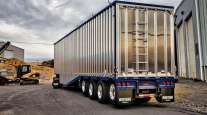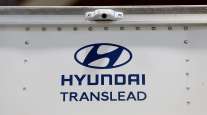Senior Reporter
September Trailer Orders Surge Past 50,000

[Stay on top of transportation news: Get TTNews in your inbox.]
U.S. trailer orders in September went through the roof — preliminarily clearing 50,000 — to reach the third-highest monthly total ever, analysts said.
One trailer maker executive said it felt like boom time again as backlogs grew longer and supply chains appeared likely to become strained.
A year earlier, trailer orders were 18,675, according to ACT Research.

A welder at a Stoughton Trailers plant in Stoughton, Wis. (Stoughton Trailers)
“September will be the third-highest month of all time,” said Frank Maly, director of commercial vehicle analysis and research at ACT. “It appears strong from a gross order standpoint and it’s pretty low from a cancellation standpoint, as well, which tells you everybody who’s on the order board is staying there and being joined by [a lot] more people.”
Cancellations were less than 1% of the backlog, he said.
Maly said dry van orders were the fuel powering the latest rise, and they climbed to almost four times as many as a year ago, including “a fair number” of 28-foot trailers, but not “anything way out of line.”
He speculated that fleets may be rushing to place orders to avoid delivery timing challenges. That situation harkens back to late 2018 when trailer orders poured in for the same reason.
The all-time record for trailer orders was 58,228 in September 2018. The previous high was 47,512 in October 2014.
FTR pegged the preliminary orders at 52,000.

Over the past few episodes, we've had the chance to listen to the experiences of industry leaders and the strategies and planning that go into finding the right people for your workforce. Host Michael Freeze reviews the most important bullet points, from technician and driver training to incorporating diversity in recruitment and retention. Hear a snippet, above, and get the full program by going to RoadSigns.TTNews.com.
“There is expansion demand, replacement demand, dealer demand, just an enormous amount of demand for dry vans to keep consumer goods on the move. Fleets are expecting the hot freight market to continue into 2021 and want to be prepared with adequate capacity. Reefer demand should also continue to be strong, and benefit from more restaurant activity as 2021 progresses,” said Don Ake, vice president of commercial vehicles at FTR.
“A few months ago, fleets were only ordering what they were sure they needed because of the uncertainty,” he said. “It has just totally flipped from that environment to ‘Gee, how many trailers do you think we’ll need next August? Throw on an extra 20, just in case.’ ”
Flatbed orders remained sluggish, Ake added.
The industry is adjusting, said Chris Hammond, executive vice president of sales at Great Dane.
“We continue to see flatbeds lag and food service customers are still looking at what 2021 may look like. So I welcome the recent surge but I am also cognizant of the challenges ahead with COVID-19 and different segments in our economy,” Hammond said.
The surge in orders, however, did not catch Great Dane off guard. he said. “We’ve seen stock orders from our distribution groups as on-hand inventory in vans and reefers has come down substantially.”
At Stoughton Trailers, said David Geisen, vice president of sales, demand had been increasing but September’s strong orders were somewhat of a surprise. The orders and lengthening backlog will “put a strain on the supply chain. It’s unknown as to what components will be the problem first, but expect some.”
At Hyundai Translead, Chief Sales Officer Sean Kenney said the indirect channel was refilling their stock pipeline and multiple customers are beginning to place orders for 2021. “September was a great month for the industry overall.”

Trailers on the production line at a Hyundai Translead manufacturing plant. (Hyundai Translead via Vimeo)
Meanwhile, some trailer makers are in the early stages of thinking about freight shipments of potential COVID-19 vaccines that would need to be deeply refrigerated during transport.
“Internally we have had some discussions on what this might look like but have not arrived at any real conclusions as of yet because there are so many variables involved and, as all are aware, these variables seem to update on a near-daily basis as things continue to evolve,” said Kenney.
Hammond agreed some general discussions are happening with various private and for-hire fleets regarding pharmaceuticals and vaccines. “We already build equipment suitable for this type of haul so there shouldn’t be any issue with equipment being available to serve these needs,” he said.
One former trailer maker executive, active now as a consultant, offered a cautious anecdote on delivering needed medicine in a timely manner, especially in rural areas.
“Our local family physician here in Petoskey, Mich., holds a flu shot clinic every year in the fall and they have been unable to get their allocation so far this year. It is now over a month late,” said Charles Willmott, CEO of WillGo Transportation Consulting, and formerly chief sales officer at Strick Trailers. “This doesn’t bode well for timely and efficient production and distribution of a COVID-19 vaccine even after one or more are properly tested and vetted by the medical community.”
Want more news? Listen to today's daily briefing:
Subscribe: Apple Podcasts | Spotify | Amazon Alexa | Google Assistant | More




